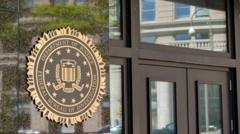In a landmark decision, Australian lawmakers have enacted strict legislation addressing antisemitic acts and the display of hate symbols, igniting a contentious discussion about criminal justice policies and civil liberties.
New Australian Laws Mandate Jail Time for Hate Symbols and Nazi Salutes

New Australian Laws Mandate Jail Time for Hate Symbols and Nazi Salutes
Australia introduces strict penalties for hate crimes amid rising antisemitism, igniting debate on justice approach.
Australia has taken a significant stance against hate crimes, advancing new legislation through parliament that enforces mandatory prison sentences for certain offenses linked to hate symbols and terrorism. The laws, passed after a surge in high-profile antisemitic incidents, entail jail time ranging from one year for performing Nazi salutes to six years for committing or planning terrorist activities.
The legislative amendments represent a robust action by the government, which officials assert are the "toughest laws Australia has ever had against hate crimes." This legislative move comes on the heels of several disturbing incidents targeting Jewish communities across the nation.
Among the recent assaults, a caravan containing explosives and an antisemitic message was uncovered in Sydney, adding to the growing anxiety within Jewish communities. The prior weeks had already seen multiple attacks, including the arson of a childcare center near a synagogue, and an incident where a Melbourne synagogue was set ablaze, fortunately with no casualties among worshippers.
While the government celebrates the tougher stance against hate crimes, opposition voices raise concerns that the ruling Labor Party compromised its principles. Critics, such as former senator Kim Carr, argue that the party’s endorsement of such mandatory sentences contradicts its longstanding policy, which opposes them on grounds that they may not effectively reduce crime and could perpetuate systemic discrimination.
The newly imposed penalties have also faced skepticism from opposition parties. Liberal senator James Paterson remarked on the delay in legislative action, arguing it was not a proactive decision by the Labor Party but rather a reaction to public and political pressure.
In January 2024, the government had already banned the performance of Nazi salutes and the display of associated symbols, a decision that illustrated shifting national attitudes toward combating hate. With these recent changes to the law, legislators hope to illustrate a clear position against violence incited by hate and safeguard communities from these actions.
Home Affairs Minister Tony Burke emphasized the essential nature of the legislation in a recent statement, arguing that the measures serve to affirm that advocating violence against individuals based on identity is intolerable within Australian society. As the country grapples with issues surrounding hate and community safety, the impact of these laws will likely be closely monitored and debated in coming years.




















